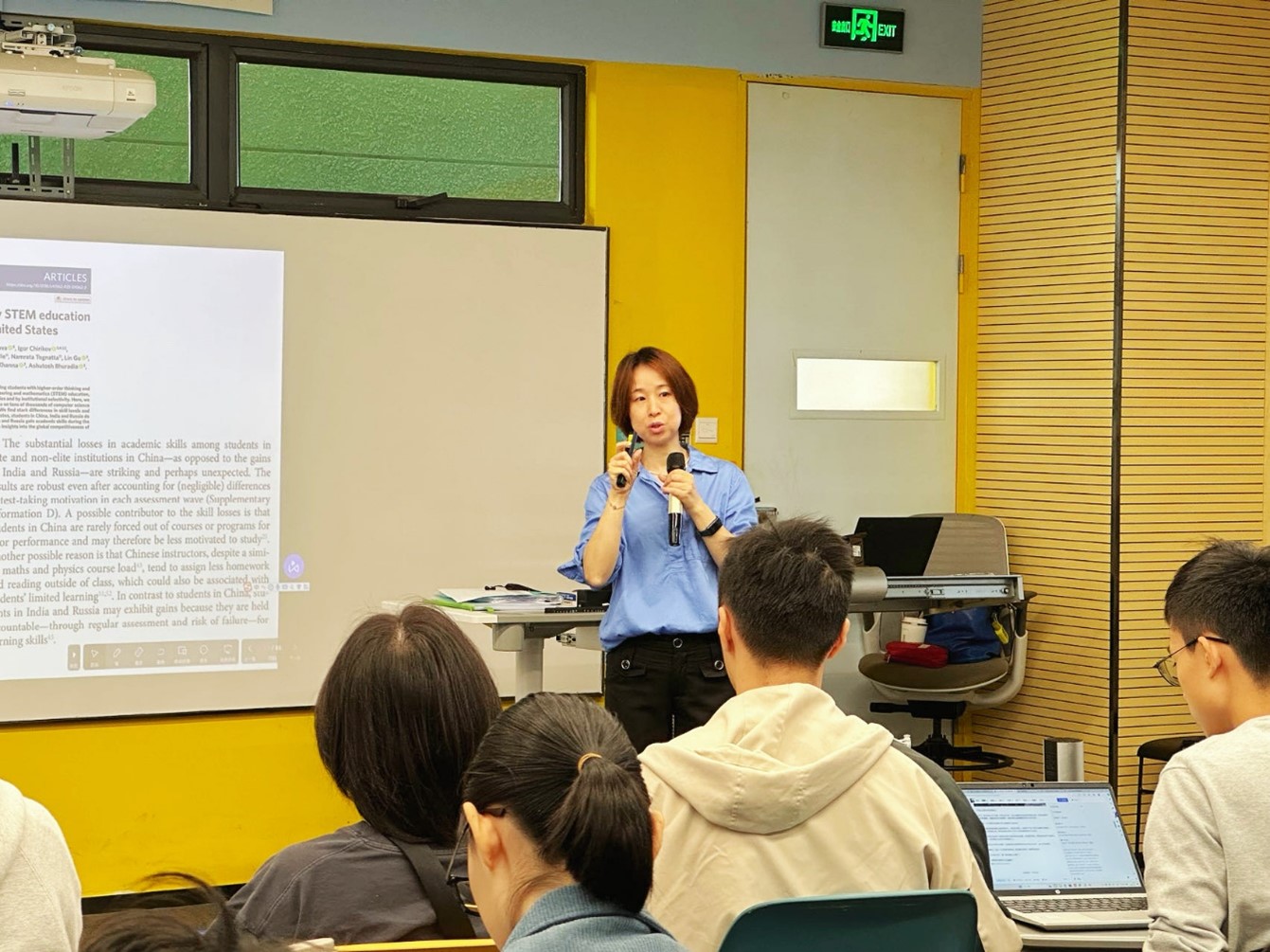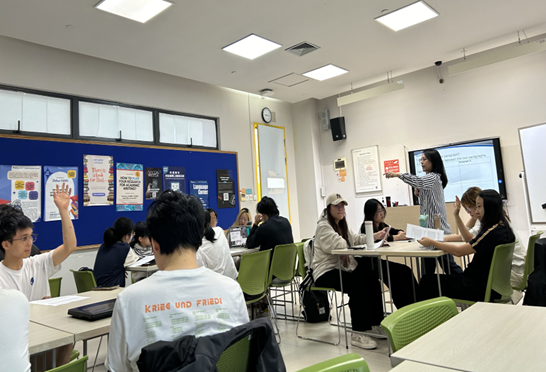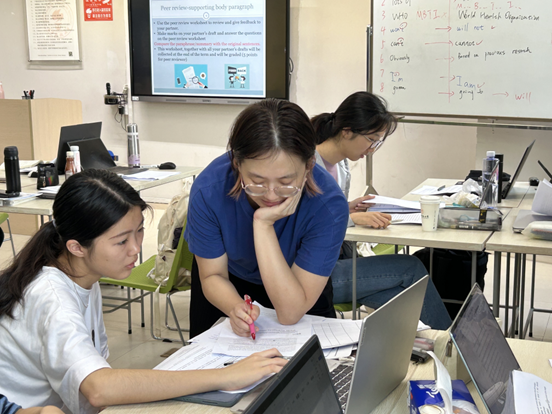Course Title: English for Academic Purposes (EAP)
Course Category: General Education (GE) Required Courses
Course Coordinator: Dr. LI Zhuo

Dr. LI Zhuo is an Associate Teaching Professor of English at the Center for Language Education, Southern University of Science and Technology (SUSTech). She has been teaching seven compulsory courses and two electives at the undergraduate and graduate levels since joining SUSTech in 2013. As the course coordinator, she is responsible for the overall planning and development of the EAP course.
Course Team Members:
CHU Yu

SHI Xiao

Semester: Spring/Fall
Assessment: Exam
Credit Hours: 32
Credit: 2
Course Description and Objectives
The English for Academic Purposes (EAP) focuses on research writing and teaches students the skills necessary to use English effectively in a variety of academic contexts. EAP students are encouraged to focus on issues which interest them, think critically about those issues, and develop their topics through research into two major assignments, including a group research presentation and an individual argumentative research paper. In addition to group work, peer editing also plays an important role, motivating students to support each other, with the teacher acting as a guiding facilitator, careful to shed light, not to master.
Within the EAP framework, presentation and writing parameters are set, while at the same time, aiming to give students autonomy over their work, encouraging them through constructive feedback from both the teacher as well as their classmates. By completing the course, students are expected be aware of, and produce, work that conforms to academic norms.
At the completion of the course, students should be able to:
Generate a research question that responds to modern social or scientific issues;
Select relevant sources using library databases and identify reliable resources;
Recognize and reinforce academic vocabulary;
Demonstrate understanding of features of academic reading and writing;
Carry out the responsibilities and roles of working cohesively in a group for research presentations;
Respond to feedback and request clarification;
Analyze successful strategies for paraphrasing and summarizing;
Distinguish formal language and informal language and demonstrate the appropriate use of the former in academic speaking and writing;
Assess the dangers and pitfalls of plagiarism and how it affects academic integrity;
Develop self and peer evaluative techniques which incorporate reflective practices for further improvement;
Complete an argumentative research paper through process writing;
Improve writing through critical peer-editing, acting as a voice of change, not complacency.
Textbooks
Slaght, J. & Pallant, A. (2015). Reading English for Academic Study. Beijing: Foreign Language Teaching and Research Press.
Zemach, D.E., Broudy, D., Valvona, C., & Gao, X. (2015). Writing Research Papers. Beijing: Foreign Language Teaching and Research Press.
Course Highlights
The teaching philosophy of "student-centered learning” is consistently integrated throughout this course, aiming to cultivate students' autonomous learning in the process of research, presentation, writing, editing, and evaluating. This course adopts task-based language teaching method. The main outcome of students' learning is to gradually develop and present their research results, ultimately completing an argumentative research paper through process writing. Furthermore, four teaching approaches are implemented.
Cooperative research: At the beginning of the semester, students are informed of the group argumentative research task. They collaborate in groups to determine their own research topics.
Flipped embedded library research training: To assist students in conducting research more effectively, EAP instructors and librarians collaborate to provide information literacy training through a flipped blended teaching approach.
Group research presentation: During midterm, students present their research in groups to demonstrate their findings, preparing them for further writing in the second half of the semester.
Process writing: After the midterm presentation, students expand their research into a complete academic research paper, following a process writing approach.
A multidimensional teaching support system is another feature of this course. In addition to classroom teaching, the EAP course team regularly holds EAP workshops each semester for all faculty and students. EAP instructors also share learning materials on Blackboard for students to preview and review the course content outside the classroom.
Course Ideological and Political Education Development
This course encourages students to explore independently and think critically. It helps students understand their social roles, broaden their horizons, cultivate critical thinking, and develop a sense of social responsibility. The course's political and ideological education is reflected in the following aspects:
Humanistic literacy: Given that students’ research process provides an opportunity for humanistic exploration, EAP instructors guide students to discuss and reflect on the role of humanistic spirit in the development of science and technology.
"Global Englishes" concept: In classroom sharing sessions of TED talks, diverse speech materials are selected, including speeches from both native and non-native English speakers. This approach enables students to view the functionality of language more objectively, fosters a global perspective, and enhances cultural inclusiveness and cultural confidence.
Academic integrity: “Academic integrity" is an important component of the curriculum. The teaching content includes introducing reliable information sources, using standardized citation formats, and avoiding plagiarism and academic misconduct. The assignment of plagiarism reflection paper involves students conducting case studies to recognize the importance of academic integrity and to practice citing literature accurately.
Critical thinking skills: Students need to form their own opinions on controversial social or technological issues and ultimately express their reasoned viewpoints in writing. From brainstorming and selecting topics, to literature search, reading, midterm research presentations, and paper writing, students’ critical thinking and independent judgement are essential throughout the research and writing process.
Course Development Plan
The future development of this course is positioned as a core course in general English education at an international first-class university of science and technology. The development plan is as follows:
Expert guidance: To improve teaching in the future, the course team plans to invite experts in the field of academic English teaching for guidance and consultation.
Professional development: To help teachers enhance their professional development and improve teaching quality, the course team needs to participate in relevant teaching workshops or seminars.
Interdisciplinary collaboration: In the continuous development of EAP, the course team intends to conduct interdisciplinary cooperative teaching and research collaboration with instructors from other disciplines in science and technology.
Resource development: In future teaching preparation, the existing online and offline resources will be updated and expanded. Additionally, the course team will endeavor to explore the application of AI in academic English teaching, such as personalized learning through AI, intelligent teaching assistance, and intelligent academic search.